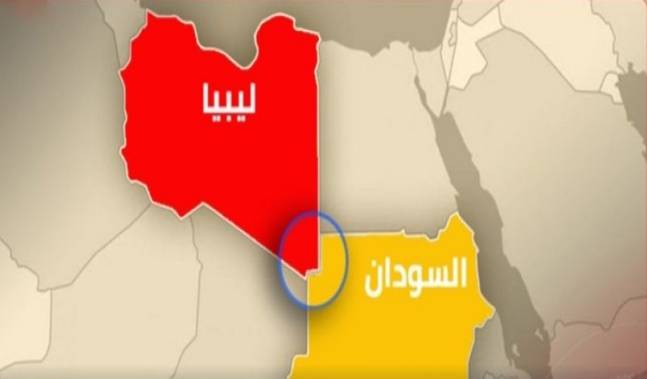
Sudan’s “Border Triangle” Battle Shifts the War onto a New Trajectory
Sudan Media Forum
Malaak Jamal Balla, Dongola (Jabraka News) — In a significant shift in the trajectory of Sudan’s armed conflict, the Rapid Support Forces (RSF) announced their takeover of the “Border Triangle” area deep in the desert of northwestern Sudan, where the borders of Sudan, Egypt, and Libya intersect. The capture followed fierce battles with the Sudanese Armed Forces and joint forces, ending with the Sudanese army withdrawing from the area.
Following its control of the triangle, reports suggest the RSF is preparing airports in southern Libya to serve as logistical hubs supporting its operations inside Sudan.
Despite the military escalation, the RSF asserted that it would keep the triangle crossing open for humanitarian purposes, describing it as a “lifeline for millions of Sudanese deprived of food and medicine.”
A Strategic Triangle Rich in Resources
The Border Triangle is an extremely strategic area, not only due to its geographic position connecting three countries, but also because of its vast natural resources, including iron, copper, and uranium. Despite its harsh desert conditions, it serves as a vital passageway for goods and migrants, and is one of the most prominent smuggling corridors between Sudan and Libya.
RSF Declares Full Control
RSF field commander Abdullah Haqar told Jabraka News that his forces had “established full control over the triangle after fierce battles.” He added, “The area is under Sudanese sovereignty, and it is among the legitimate objectives of the RSF,” confirming that their capture of it was part of the ongoing military operations on the ground.
Haqar further stated that his forces had also taken control of the “Karnab Al-Toum” road linking Northern State to North Darfur, describing the area as “a vital military, economic, and political artery.”
Accusations and Denials
Haqar claimed that joint forces and the Sudanese army had been detaining Sudanese civilians and migrants en route to Libya, demanding money for their release. “We freed a large number of captives and are providing civilians with medical care, shelter, and food,” he said.
However, Saif Al-Nasr Al-Tijani, a commander in the joint forces, denied these accusations, asserting that “the joint forces did not detain civilians or demand money for anyone’s release,” adding, “We protect citizens, while the RSF is known for its violations.”
A Hub for Smuggling and Organized Crime
Haqar said the area has long been used for weapons and human smuggling, stressing that RSF control would help curb these activities. Conversely, the joint forces argued that the RSF’s moves in the triangle were a result of its loss of positions deeper inside Sudan and declining regional support, especially after shifts in the positions of Chad, the Central African Republic, and South Sudan.
Logistical Preparations in Southern Libya
According to Saif Al-Nasr Al-Tijani, the RSF is preparing airports in southern Libya — such as Kufra and Sabha — as logistical centers to support its operations inside Sudan, using crossings like the triangle and Al-Malha as strategic corridors to supply its forces.
Al-Fashir: The Next Decisive Battle
The joint forces see Al-Fashir, the capital of North Darfur, as the next crucial battleground. Al-Tijani said: “Defending Al-Fashir requires deploying a fully integrated force with logistical and food security.” He warned that the RSF aims to seize Al-Fashir in order to declare its own state and open an air bridge to Darfur.
He added: “For militias to enter from the north or Libya into Dongola or Al-Fashir would be extremely difficult without internal security loopholes, which we are working to prevent.”
Postponed Peace or Escalating Conflict?
When asked about chances to return to the negotiating table, Haqar stated that “the stage has moved beyond negotiations,” arguing that “RSF leaders know the other side is not interested in peace, but in prolonging the war.”
Political analyst Maher Abu Al-Joukh commented that “the RSF’s control of the triangle represents a shift in the course of the war,” adding that their presence on the fringes of Northern State strengthens their earlier threats of advancing toward it.
Abu Al-Joukh continued: “The RSF is no longer as enthusiastic about negotiations as it once was, making escalation the more likely option.”
A Border Crossing with Strategic Value Beyond Borders
Control of the triangle represents a strategic prize for any side, not just for its geography but also for its political, economic, and military dimensions. The crossing is a critical supply route and a hub of influence that can shape the balance between war and peace.
A Proxy War
Observers believe the conflict in Sudan is not free from regional interventions. Abu Al-Joukh argued that some regional powers fund parties to the war according to their shifting interests, adding, “The outbreak of tensions between Iran and Israel could change the region’s calculations, pushing toward either political settlements or renewed escalation in other places like Sudan.”
Control of the Border Triangle marks a new phase in a war whose circle of destruction expands day after day. Between those who see it as a political bargaining chip and those who view it as part of a long-term RSF strategy, the undeniable truth is that the Sudanese people caught in the middle are the ones paying the highest price.
--
The Sudan Media Forum and its member institutions publish this report, prepared by Jabraka News, as part of its close monitoring of the shifting dynamics of Sudan’s war and its internal and regional implications. The article highlights the struggle between the army and the RSF over a border area rich in vast natural resources including iron, copper, and uranium.


